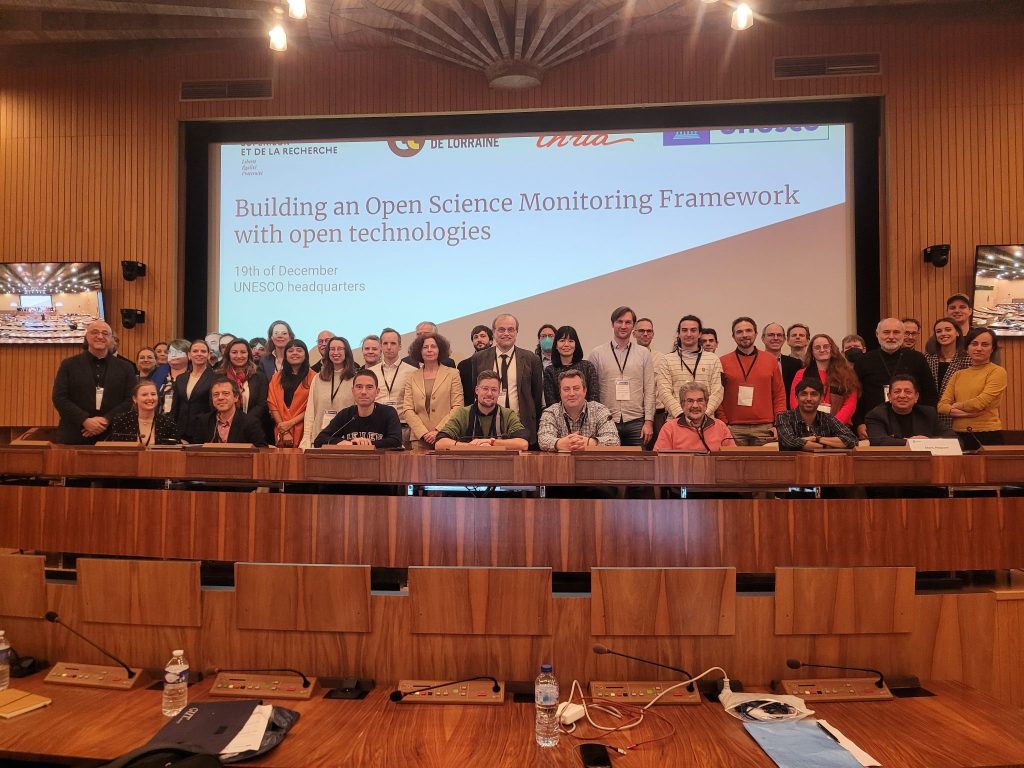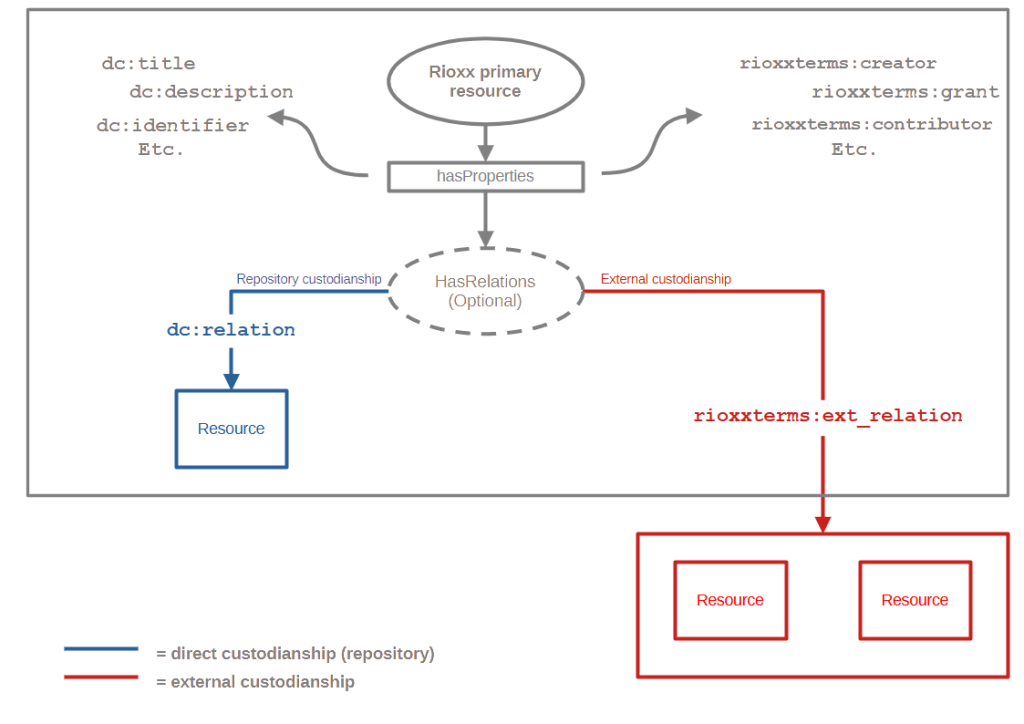We support a huge range of data providers, from the smallest institutional repositories to the largest Open Access and preprint repositories such as PubMed Central and Arxiv. Each of these repositories have differing needs but one requirement for almost all of them is increasing the visibility and discoverability of their content. Being indexed by CORE is a key component in meeting these requirements. A recent study demonstrated that being indexed by CORE increases downloads from a repository by an average of 16%, and up to 32% in some cases.
CORE participating in the UNESCO Open Science Monitoring Framework launch
In December, Professor Petr Knoth, founder and team lead for CORE was invited to participate in a workshop entitled ‘Building an Open Science Monitoring Framework with open technologies’ hosted by UNESCO at their Paris headquarters.

With many public and funder policies now mandating Open Access deposit of funded research, the need for tracking and measuring the impact of these policies becomes more pressing. This international workshop brought together more than 50 experts from research organisations, universities, nonprofits and national agencies to discuss how open technologies can best help in this effort and work towards monitoring the progress of open science itself.
SoFAIR is live! Kickoff, progress and website launch
This spring saw the launch of the multi-national SoFAIR project (Making Software FAIR: A machine-assisted workflow for the research software lifecycle), coordinated by The Open University and involving teams from six institutions across 5 countries. The project is funded by a €494k research grant in the international CHISTERA Open Research Data & Software Call which aims to enhance the discoverability and reusability of open research software.
The consortium partners
In January the SoFAIR project partners headed for the slightly chilly surroundings of Milton Keynes to gather for the SoFAIR project kick off meeting. The meeting took place over two days at the Walton Hall campus of The Open University and we were grateful to all of the project partners who travelled to the U.K. to join us. We were also fortunate enough to be able to arrange a visit to Bletchley Park as part of the proceedings.
AI for the Research Ecosystem workshop – #AI4RE
On March 22, 2024, the AI for the Research Ecosystem workshop (#AI4RE) took place in London, kindly hosted by UCL in the wonderful surroundings of Chandler House. The workshop was part of the Turing Institue’s AI UK Fringe series of events which took place around the U.K. The workshop focused on the intersection of the recent developments in Artificial Intelligence, such as Large Language Models and Deep Learning, and how these developments will impact current research practices.
The packed programme opened with a keynote by Prof. David De Roure of the University of Oxford, exploring knowledge infrastructures, social machines and how, and if, we can measure the rate of innovation – and whether it is increasing.
CORE Board of Supporters Meeting round up
This week saw the 2nd bi-annual CORE Board of Supporters Meeting take place online. The meeting was well attended and we are extremely pleased that 24 participants from 15 member institutions joined us. The Board of Supporters is an integral component of the CORE governance structure and exists as part of our role as signatories to The Principles of Open Scholarly Infrastructures (POSI).
Figure 1: The CORE governance structure
Covered in the meeting were many of the latest developments that CORE has been working on including the conversion of PDF documents to structured text to allow for machine-readability, detecting duplicates and different versions of scholarly documents within repositories., we’re extremely grateful to Kirsten Vallee from The University of Chicago who spoke about her repository’s experience using the CORE Dashboard deduplication module.
CORE at Open Repositories 2024
This summer the 19th annual Open Repositories Conference will take place from June 3rd to 6th at the Clarion Post Hotel in Gothenburg, Sweden. Over 300 submissions were received this year and the CORE team will be in attendance, presenting several areas of the work we have been undertaking over the last few months.
We will be introducing our work as coordinators for the SoFAIR (Making Software FAIR: A machine-assisted workflow for the research software lifecycle) project, a two-year CHIST-ERA funded project which will improve and semi-automate the process for identifying, describing, registering and archiving research software.
How the Oxford University Research Archive (ORA) uses the CORE API
Jason Partridge – Open Access Service Manager at the Bodleian Libraries, University of Oxford.
One of the fundamental functions of CORE is to support Open Access. One of the most effective ways to achieve this is through automated data gathering, using the CORE API. CORE harvests and aggregates information of research papers collected from institutional and subject repositories, and from open access and hybrid journals, and makes the content available via an API (Application Programming Interface). The CORE API offers a wealth of metadata and full text content from its many data providers.
Rioxx V3.0 Integration for DSpace Repositories

With the rollout of the Rioxx V3 metadata schema, repositories can benefit from far richer metadata for their articles. Since the release of the updated schema, The University of Cambridge has been working to develop an implementation of a RIOXX v3 OAI-PMH endpoint for DSpace-based repositories which will greatly simplify the adoption of this metadata schema. The Cambridge team submitted their code to DSpace for review and this has now been approved and will be released in May 2024 meaning every institution using DSpace can benefit from this important development.
AI for the Research Ecosystem: a KMi workshop at the AI UK Fringe 2024

CORE is a part of The Knowledge Media Institute (KMi) here at The Open University. As part of the Turing Institute’s AI UK Fringe event series, Professor Petr Knoth and Dr David Pride from CORE are working together with Professor Enrico Motta and Dr Angelo Salatino from KMi and Dr Aldo Lipani from UCL to organise the “AI for the Research Ecosystem” (AI4RE) workshop which will highlight the rapid evolution of AI and its significant impact on the entire research process.
Technologies like deep learning and large language models are poised to transform various stages of research, including study design, literature reviews, code design, data collection and analysis, dissemination, peer review, and research assessment. The workshop aims to provide insights from expert speakers across the research spectrum, involving researchers, institutions, policymakers, funders, and commercial entities. The event serves as a catalyst for addressing fundamental questions about the implications of AI developments for the research community, emphasizing the need for responsible and ethical AI design and usage. Additionally, the workshop aims to explore how stakeholders can best organize and democratize these AI technologies for the benefit of the research ecosystem.
CORE invited to UNESCO workshop on ‘Building an Open Science Monitoring Framework with open technologies’

Professor Petr Knoth, founder and team lead for CORE was recently invited to participate in a workshop entitled ‘Building an Open Science Monitoring Framework with open technologies’ hosted by UNESCO at their Paris headquarters.
With many public and funder policies now mandating Open Access deposit of funded research, the need for tracking and measuring the impact of these policies becomes more pressing. This international workshop brought together more than 50 experts from research organisations, universities, nonprofits and national agencies to discuss how open technologies can best help in this effort and work towards monitoring the progress of open science itself.
